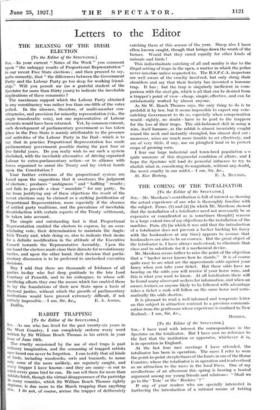Letters to the Editor
THE MEANING OF THE IRISH ELECTION
[To the Editor of the SPECTATOR.]
Sur,—In your current " Notes of the Week " you comment upon " the unhappy results of Proportional Representation " in our recent Free State elections ; and then proceed to say, quite correctly, that " the differences between the Government Party and the Labour Party go too deep for working friend- ship." Will you permit me (as a grateful student of the Spectator for more than thirty years) to indicate the inevitable implications of these comments ?
The maximum support which the Labour Party obtained in any constituency was rather less than one-fifth of the votes polled. In the absence, therefore, of multi-member con- stituencies, and provision for minority representation (viz., the single transferable vote), not one representative of Labour interests would have been returned. Yet, by common consent, such development of parliamentary government as has taken place in the Free State is mainly attributable to the presence and activities of the Labour Party in the Dail—which is to say that in practice Proportional Representation has made parliamentary government possible during the past four or five fateful years. Do you really wish to see such a system abolished, with the inevitable alternative of driving organized Labour to extra-parliamentary action—or to alliance with forces organized to annul the Treaty and lay violent hands upon the Constitution ?
Your further criticisms of the proportional system are based upon the suggestions that it overtaxes the judgment of .electors ; produces " ambiguous " and " baffling " results ; and fails to provide a clear " mandate " for any party. So far from justifying any of these objections the result of the recent elections may be claimed as a striking justification of Proportional Representation, more especially if the absence of settled party traditions, and the prevalence of inevitable dissatisfaction with certain aspects of the Treaty settlement, be taken into account.
The simple and outstanding fact is that Proportional Representation enabled the electors to express, by an over- whelming vote, their determination to maintain the Anglo- Irish Treaty and, while doing so, also to indicate their desire for a definite modification in the attitude of the Executive Council towards the Representative Assembly. Upon the one hand the electors made clear their distaste for revolutionary tactics, and upon the other hand, their decision that parlia- mentary discussion is to be preferred to unchecked executive decisions.
May I add that there are thousands of Irishmen of all parties to-day who feel deep gratitude to the late Lord Courtney of Penwith, and to his colleagues, to whose self- sacrificing efforts they owe the means which has enabled them to lay the foundations of their new State upon a basis of electoral justice, without which the growth of parliamentary institutions would have proved extremely difficult, if not














































 Previous page
Previous page